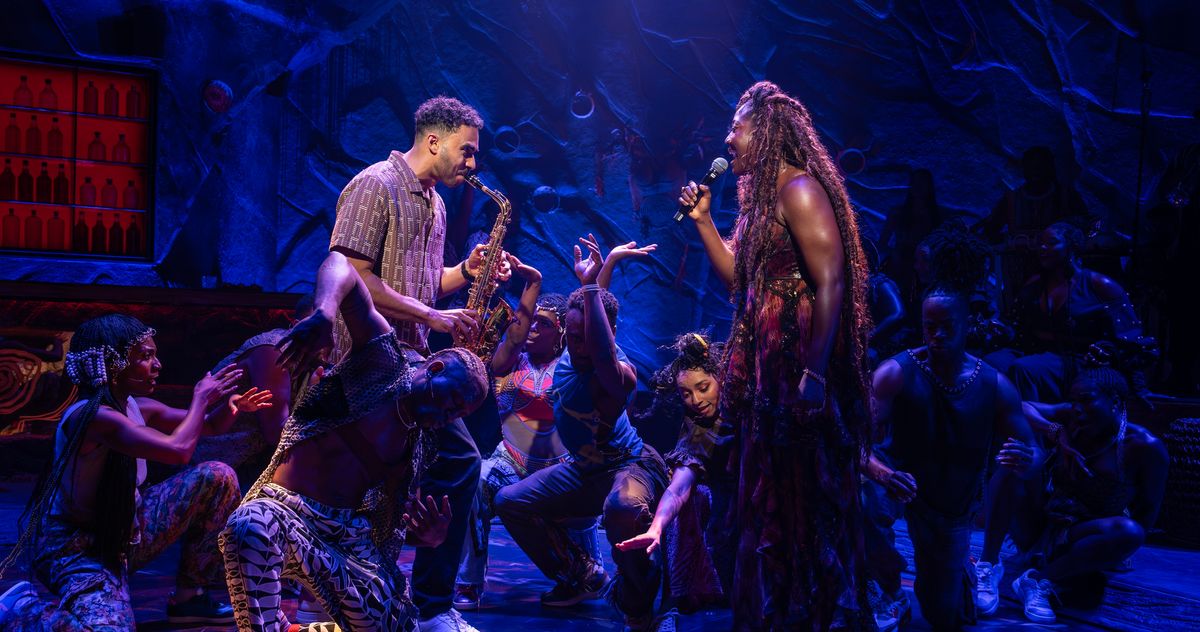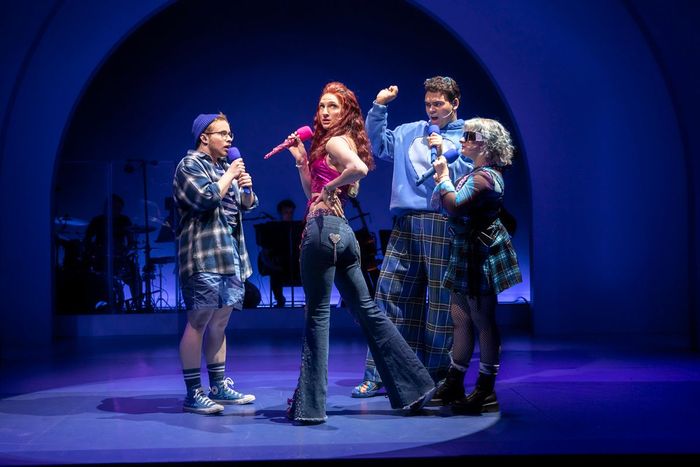From Goddess, at the Public.
Photo: Joan Marcus
If you need someone to sing like a deity, you could do a lot worse than Amber Iman, whose voice can traverse several states of matter in quick succession. It can be deep and solid as obsidian, then fluid as water, fluttering into a riff like air, or zapping into a held note with the charge of plasma — all with remarkable ease and control. Iman’s been an if-you-know-you-know musical-theater star for the past few years, excellent in Shuffle Along and Tony nominated for her brief run as the girlfriend in Lempicka. In Goddess, she gets a title role, playing the East African goddess of music Marimba, who has descended to our mortal realm and taken up a life performing at a club in Mombasa. Her human form, named Nadira, is introduced lovingly via performance, with Iman lit as if she’s conjured the spotlight herself. “On a night with no breeze,” she sings, “the sweat drips down my chocolate skin,” her voice descending on that “down” as if it’s also a bead of water rippling over skin to the earth.
Iman’s Nadira is so magnetic, it’s no surprise she ensnares a human admirer: Omari — played by Austin Scott — a perky aspiring politician who’s hiding his talent for the saxophone from his family. Immediately, the divine collides with the inane, and Goddess runs into a fundamental dramatic snare. Its humans are a lot less interesting than its god, but it relies on them to generate its plot. That’s no offense to Scott, who sings well and is charming enough to hold the stage. It’s more that, outside its portrayal of Nadira, the show’s book, credited to its director Saheem Ali, who is himself from Kenya, is made up of a series of generic complications, most of which hinge around Omari. (The shakiness of its book may stem from the project’s development history; original librettist Jocelyn Bioh left the show this spring after its 2022 premiere at the Berkeley Rep, after which James Ijames joined to provide additional material.) Omari’s father, Hassan (J. Paul Nicholas), is the conservative Muslim governor of Mombasa, fond of attacking the immorality in nightclubs like the Moto Moto, where most of Goddess is set, though he’s withdrawn from his reelection campaign after an illness. Omari wants to step up and run in that absence, and in that he’s got the support of his duty-bound mother Siti, (Ayana George Jackson), and ambitious fiancée, Cheche (Destinee Rea). He also believes that succeeding in politics means abandoning his love of music. Of course, those at Moto Moto disagree. The bartender, Rashida (Arica Jackson, nailing comic relief), tells him in typically direct dialogue, “Stop hiding your gift, or the gods will take it away. Rise up from the shadow of your father, man!” “Okay, that was dramatic,” says Omari.
All of that has very little to do with Iman’s goddess Marimba turned human Nadira, something Goddess never figures out how to square. That’s too bad, because the production is strongest when it does dramatize aspects of myth. In between scenes of those human affairs, a trio of narrators who serve roles very much like the Fates in Hadestown intercede to provide Marimba’s backstory, and the show gets tense and epic. Marimba is the daughter of the goddess of death Watamaraka, whose visage Goddess renders via a genuinely scary skull-shaped puppet by Julian Crouch. Pressured by her mother to push humans into violence, Marimba has abandoned her calling, refashioned a bow into an instrument, and gifted humanity with music instead. Then, she takes on a new identity, flees her mother to reside in a cave on the spot where the Moto Moto was built. As Nadira, she never leaves the club itself lest her mother catches her, a complication that further constricts Goddess — as a character, she’s given a rich introduction, but in the actual present motion of the plot, must be both literally and figuratively stagnant. There are flickers of love between her and Omari, a hint of her desire to abandon godhood and embrace human existence, and the threat her mother will kill any suitors, then we’re back to discussing whether a young leftist can hack it in a multiethnic capital’s electoral politics. This makes Goddess less a musical about a goddess and more “What if Fiorello! were about Zohran Mamdani?”
A good score can provide an indecisive work with a strong center, and Michael Thurber’s music, especially as performed by Goddess’s powerhouse vocalists, delivers bursts of energy. Thurber’s songs quote from a variety of influences, most heavily jazz and Afrobeat. Ali, as evidenced by his work in Buena Vista Social Club, knows how to bring an ensemble together for a good party scene. The gestures of Darrell Grand Moultrie’s choreography thread together the divine, in the narration of those scenes about Marimba’s origins, with the bumping and grinding of the club, which touches the latter with the air of the holy. The storytelling in movement tends to work: That spark between Nadira and Omari, for instance, is at its most convincing when they’re grooving together with him on the sax. But the text set to that music doesn’t. The lyrics, also Thurber’s, reiterate the kinds of platitudes found in Goddess’s book. “But he is human, I am a god,” goes one of Nadira’s lines, “Between us an eternity of moon and star / Yet here we are.” That vagueness extends, also, to descriptions of music itself, which is given plenty of praise in Goddess but in broad terms. Marimba’s story, we’re told in a rushed conclusion, “reminds us that playing music requires unity.” The cumulative effect is of praising something distant, as if the true show’s subject is only worshipped but not understood.
Britney, Paris, Lindsay — the mononymous 2000s-era celebrities invoked in The Last Bimbo of the Apocalypse aren’t gods, but to the Gen-Zers who worship them, they’re pretty close. “Those girls were fearless,” one character says in a line that lands in muddy territory between ironic and earnest. “They lived their lives out loud.” In this musical created by Patrick Foley and Michael Breslin, of the terminally online Pulitzer Prize finalist Circle Jerk, a trio of internet sleuths born after 2006 become obsessed with an infamous paparazzi renaissance frieze of Spears, Hilton, and Lohan — the always sensitive New York Post called it the “Bimbo Summit.” They believe they see the hand of a fourth, forgotten bimbo named Coco in the corner of the frame. Today, the other three women have been reclaimed, these sleuths reason. Raised on true crime and other conspiracies, they make it their goal to figure out why Coco faded from public view and to return her to her pedestal alongside the rest.
That quest for Coco is a great, grabby hook for a musical, though The Last Bimbo struggles to live up to its elevator pitch. Partially, it’s that the internet, which, sure, is something like a life-controlling deity, is as difficult to render in drama as any other divine force. Foley and Breslin opt for turning the stage into a simulacrum of a livestream, with a lonely girl who’s become famous as “She/Her/Sherlock” (played by Milly Shapiro of Hereditary) logging on to the channels of the aughts-obsessed vloggers “Earworm” and “Bookworm” (Luke Islam and Patrick Nathan Falk) to recruit them to help her find Coco. In a choice that does at least relieve the audience from being bombarded with video, director Rory Pelsue has the actors pull hand mics from holsters as they start recording, shifting from their solitary home lives into chattery meme-spouting personas. That makes for a show that often plays out on a nearly bare stage (the scenic design is by Stephanie Osin Cohen), leaving Shapiro & Co. awfully exposed as they recite approximations of current teen-speak. Although Foley and Breslin do speak the language of the infinite scroll, they tend to deploy references in furious scattershot, and they don’t all cohere. So they veer between the postured nihilism of people who spend too much time on their phones (there are 9/11 jokes) and plaintive Dear Evan Hansen–esque statements about how bullying is bad. Shapiro’s character refuses to show her actual face on a stream because of a brutal comment about her looks someone made when she was very young. She also delivers lines like, “I’m an intersectional feminist, but dead white girls are my crack.”
From the New Group’s Last Bimbo of the Apocalypse.
Photo: Monique Carboni
Bimbo’s depiction of the 2000s, too, could use a firmer focus. The gist is there: Coco, played by a slinky bell-bottomed Keri René Fuller, is introduced by way of a failed single called “Something Out of Nothing,” which Breslin (who is credited with the music) renders with the trancelike sheen of a pop song you might’ve heard through tinny speakers in a Limited Too. Those sleuths find a photo of her with her mother (Sara Gettelfinger, channeling Donna Murphy as Mother Gothel) and a girl in a hoodie (Natalie Walker, making vocal fry the stuff of Wagner), and from there, they launch into wild speculation about what happened — was that girl her stylist? Her lover? Can we blame Perez Hilton for this somehow?
These sleuths are on a quest for the truth, yet Bimbo is remarkably incurious about its characters’ context and emotional states. Like a lot of musicals written by those fresh to the form, it has the problem of songs that simply restate what has already been established in dialogue, and dialogue that fills in what could be a song. (I’d kill for a process number that describes how tabloids of that era operated, instead of a simple hand wave saying they were vicious.) Breslin and Foley also fall into recursion of a different kind, reiterating fashionable ideas on celebrity to an audience they presume will snap along in delight. For instance, Bimbo takes as a given that the bimbos of yore were far savvier than they were given credit for. That’s something I’m happy to believe. I’ve read the Pitchfork reclamations of Britney’s 2007 album, Blackout, too. Those essays engage with the ways a star like her might’ve synthesized multiple trends at once, worked with specific producers, had opinions about the sound they wanted. In Bimbo, however, we only get simple, memetic statements about why Coco deserves to be resurrected. “Everyone laughed at her,” says Shapiro of Coco.” “But we love her!” says one of the bloggers. “And she loved herself!” Adds another. “Look how she’s absolutely serving.” She who slays does so simply because we have decided she slays.
Where Coco ought to reveal herself in song, where the authors might pry into a character’s interiority, we instead get a mirror ball of a psyche. There’s a point about celebrity worship in there, but it’s awfully slick and cynical, and that sleek emptiness overtakes Bimbo even when it eventually contorts into a series of rug pulls, as that trio of streamers uncover (or think they uncover) some dark truths about Coco and her mother. These get difficult to follow but are never quite shocking, because for all its posturing at bleakness — more than a few doomer-y lyrics reference the apocalypse of the title — Bimbo doesn’t challenge many assumptions. That’s a dangerous thing about the internet: It’s happy to regurgitate what you already feel right back at you.
Goddess is at the Public Theater through June 8.
The Last Bimbo of the Apocalypse is at the New Group through June 1.













